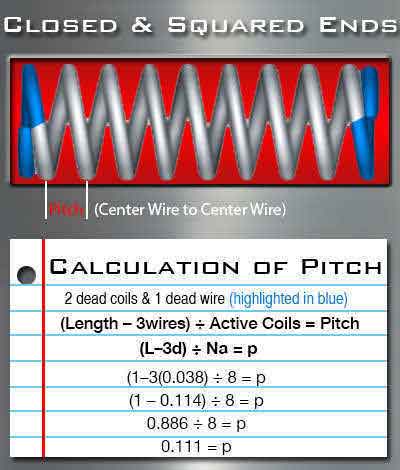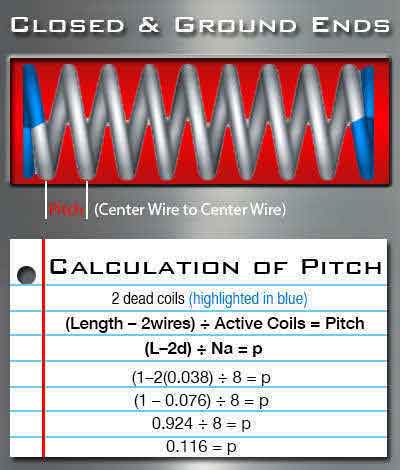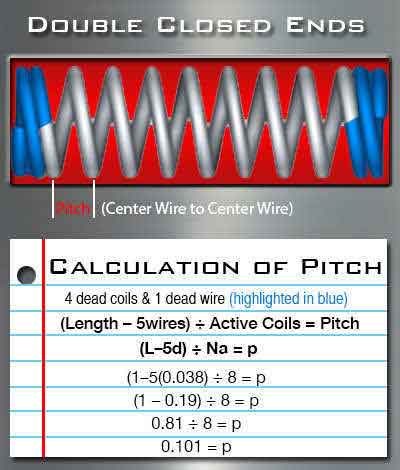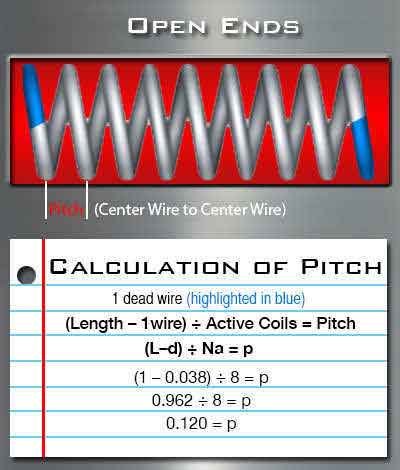Spring Pitch Calculator
Definition:
Spring calculator which calculates spring pitch. Spring pitch is the distance in between a helical spring’s adjacent coils from center of wire to center of wire.
Spring pitch is a dimension which can be difficult to calculate if the right procedures and formulas aren’t followed. Our spring calculator will calculate this value automatically but if you want to know how we’ve done it, the formulas used in the calculator to calculate spring pitch are provided below.
The calculation of spring pitch is different depending on the type of ends. Below are the formulas for the types of ends which are provided in our spring pitch calculator. These types of ends are closed and squared, closed and ground, double closed, and open ends.
Closed and Squared
The most common type of ends. This end type has two closed coils which are inactive and therefore have no pitch in between. These are dead coils. There is also a dead wire because, since spring pitch is calculated from center of wire to center of wire, half of the last wire is also dead so if we join both halves from both ends, they make up one full wire. This means that we’ll have to subtract three wires from the free length before we divide the length by the active coils as shown in the formula below.
Formula for Spring Pitch:
(L – 3d) ÷ Na = pL = Length d = Wire Diameter Na = Active Coils p = Pitch
Example:
Based on the given formula. The example shown below demonstrates how to calculate your compression spring's pitch.
- [1 – ( 3 x 0.038)] ÷ 4 = p
- (1 – 0.114) ÷ 4 = p
- 0.886 ÷ 4 = p
- 0.222 = p
Diagram

Closed and Ground
This end type also has two closed coils as ends but these are ground for the spring to stand up vertically straight. In the previous formula, we had to subtract 3 wire diameters from the free length. In this case, since half of the wire has already been ground off, it is no longer dead space taking up our free length. This means that we will only subtract two wires from the free length and then divide the result by the active coils as shown in the following formula.
Formula for Spring Pitch:
(L – 2d) ÷ Na = p- L = Length
- d = Wire Diameter
- Na = Active Coils
- p = Pitch
Example:
Based on the given formula. The example shown below demonstrates how to calculate your compression spring's pitch.
- [1 – ( 2 x 0.038)] ÷ 4 = p
- (1 – 0.076) ÷ 4 = p
- 0.924 ÷ 4 = p
- 0.231 = p
Diagram

Double Closed Ends
For double closed ends, you must follow the same formula as you did for closed and squared ends except now we have two more closed (dead) coils. This means that you will subtract 4 dead coils and 1 dead wire from the free length. Giving you a total of 5 wire diameters subtracted from the free length, divided by the active coils. The formula below explains this concept.
Formula for Spring Pitch:
(L – 5d) ÷ Na = p- L = Length
- d = Wire Diameter
- Na = Active Coils
- p = Pitch
Example:
Based on the given formula. The example shown below demonstrates how to calculate your compression spring's pitch.
- [1 – ( 5 x 0.038)] ÷ 4 = p
- (1 – 0.190) ÷ 4 = p
- 0.810 ÷ 4 = p
- 0.203 = p
Diagram

Open Ends
Open ends don’t have any closed or dead coils. The measurement of spring pitch remains from center of wire to center of wire though. This means that you will still have to subtract one wire diameter from the free length before you divide the free length by the total coils. Follow the formula below to calculate the spring pitch of a coil spring with open ends.
Formula for Spring Pitch:
(L – d) ÷ Na = p- L = Length
- d = Wire Diameter
- Na = Active Coils
- p = Pitch
Example:
Based on the given formula. The example shown below demonstrates how to calculate your compression spring's pitch.
- (1 – 0.038) ÷ 4 = p
- 0.962 ÷ 4 = p
- 0.241 = p





 Español
Español